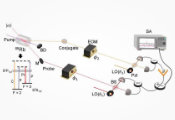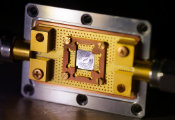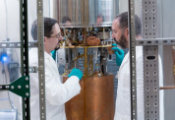Government Support to Get Quantum to Work Faster, Boosting UK’s Health, Defence, Energy and More
November 07, 2025 -- Hospital eye scanners that are more portable and affordable, ways to better manage the transport network to reduce delays and disruption, and pioneering tools to screen blood tests for cancer faster – all made possible by quantum technology – are taking a step closer to reality thanks to initiatives announced today backed by over £14 million government support (Friday 7 November).
Today, as the National Quantum Technologies Showcase brings thousands of researchers, investors, and global policymakers together in London, the UK government is taking another step forward to unlock quantum’s vast potential to drive economic growth and national renewal, and help tackle major challenges like health and climate change that are central to the Plan for Change.
A raft of announcements have been made ahead of the Showcase, backed by millions of pounds worth of funding. This includes the launch of international partnerships to keep the UK at the forefront of quantum globally, as well as the building of important quantum research infrastructure.
This includes the announcement of 14 projects sharing £14 million through Innovate UK’s Quantum Sensing Mission Primer awards, to support the development of next -generation sensors that could be used in healthcare, transport, and defence. This ranges from a new type of portable eye scanner that could replace the large and expensive OCT machines currently relied on hospitals, to a new type of sensor that would let civil engineers detect buried structures without the need for costly excavation works. Some of the companies being supported are brilliant examples of UK tech spinouts – like Cerca Magnetics, which was founded off the back of research at the University of Nottingham.
Science Minister Lord Vallance said:
Quantum technologies are changing the world – from ultra-sensitive sensors to help diagnose diseases through to the potential of a new type of computer that can do things in seconds that would take today’s computers decades to compute.
The UK already has considerable strengths and lots of exciting new companies have sprung up in the UK. The funding and agreements being announced today aim to support this exciting and important growth area right across the country.
Jonathan Legh-Smith, Executive Director of UKQuantum, said:
The achievements of the UK’s National Quantum Technologies Programme over the last 10 years have positioned the UK as one of the world’s leading quantum nations. Our companies have developed world leading technologies across the whole quantum domain - including sensing, imaging, clocks and computing - with strong engagements across sectors such as transport, finance, telecommunications and defence.
The announcements today demonstrate the translation of innovation to commercial reality is already well underway in the UK.
This is yet another step forward in government’s efforts to unlock the real-world benefits of quantum, underpinned by the £670 million for quantum computing announced in the Industrial Strategy - one of the largest and longest-term commitments made to this technology, of any government in the world.
Quantum technology is set to profoundly benefit society and the economy in the years ahead. Quantum computers could help discover new medicines in a fraction of the time it takes today, while projects launching today will support work on quantum sensors that could save civil engineers time and money, by looking deep into buildings and buried structures in a non-intrusive way, as well as new medical scanners that could diagnose epilepsy with unprecedented effectiveness.
Quantum works because at the smallest, sub-atomic scales, the regular rules of physics don’t apply. Quantum computers, sensors and other tools take advantage of this to do useful things – and in ways that can greatly out-perform their conventional counterparts. One example would be a quantum computer – which can perform a vast number of calculations simultaneously, which a classical computer would have to do one by one.
This is a technology with huge commercial potential and is priority growth sub-sector in the UK’s modern Industrial Strategy. By 2045 quantum could contribute £11 billion to UK GDP and over 100,000 jobs.
Besides the Innovate UK Quantum Sensing Mission Primer awards, today’s package of support for the UK’s quantum pioneers includes:
- Launching the new Quantum Centre for Nuclear Defence and Security at AWE. This will support AWE together with the University of Strathclyde to bring quantum computing and sensing to bear in nuclear science and technology that is vital to the UK’s security.
- A £300,000 government investment to relaunch the Scotland-California quantum and photonics partnership (SU2P). This brings together world-leading quantum researchers from across the Universities of Strathclyde, St Andrews, Heriot-Watt and Glasgow together with colleagues from Stanford University and Caltech, to unlock new opportunities for investing, and bringing quantum breakthroughs to market sooner.
They are also marking:
- The signing of a Memorandum of Understanding between the UK’s National Quantum Computing Centre (NQCC), and Japan’s National Institute of Advanced Industrial Science and Technology. This will enable easier UK-Japan collaboration in quantum computing research, as well as talent exchange.
- The successful deployment of all 7 quantum computing testbeds – operationally-ready pieces of quantum-computing hardware – at the National Quantum Computing Centre (NQCC) this year, which have been delivered with £30 million support through Innovate UK. These will enable businesses to demonstrate and validate new quantum computing technologies. By securing these testbeds early, the NQCC has reduced the risk for quantum tech developers, and means that new tech breakthroughs can be made ready for market, earlier.
- The launch of the National Metrology Institute – Quantum (NMI-Q) at the National Physical Laboratory, earlier this week. NMI-Q is a partnership for quantum R&D across the G7 plus Australia, which the UK will co-chair with the US in its inaugural term.
- The recent launch of a joint UK-Canada funding call, to support shared work demonstrating quantum communications either over land, or in space. This is being backed with nearly £3.5 million from Innovate UK.
- The forthcoming launch of the UK-Singapore quantum satellite SpeQtre, set to lift off 10 November. This mission sets to prove the feasibility of ultra-secure quantum encrypted communications in space.
Today’s events highlight a significant year for quantum – with 2025 being both the international Year of Quantum, and marking 11 years since the launch of the UK National Quantum Technologies Programme – a unique collaboration between academia, industrial and government that’s helping get quantum innovations out of the lab and onto the marketplace, sooner.
The government invested £121 million into quantum over this financial year to deliver on their ambitious National Quantum Missions – their plan to make this tech deliver for the private and public sectors.




































